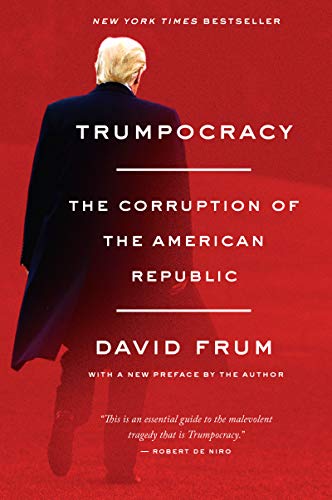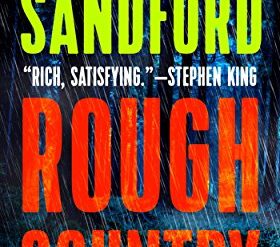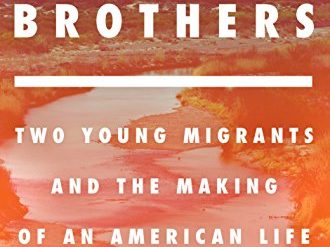
Few topics have so dominated conversation in America since November 8, 2016, as the behavior of the country’s forty-fifth president. Some commentators have likened the attention received by Donald Trump to that afforded Ronald Reagan three decades earlier. But I think there’s no comparison: Trump wins that contest hands down. He has been the subject of innumerable articles and commentaries in the media and a fast-growing shelf of books, with no end in sight. Here I’ve listed 21 of those books about Donald Trump. They’re arranged in alphabetical order by the authors’ last names, first within the top five and then within the rest.
Updated March 14, 2024.
The top 5 books about Donald Trump
A Warning by Anonymous, a Senior Trump Administration Official (2019) 272 pages ★★★★★ — An anonymous White House Republican tells all
The same “Senior Trump Administration Official” who famously wrote a disturbing Op-Ed in the New York Times (“I Am Part of the Resistance Inside the Trump Administration,” September 5, 2018) has pulled out the stops in A Warning. In fact, his new book reads much like some of the more apocalyptic rhetoric to be heard from Democratic activists. The anonymous White House Republican who wrote this book fears not just that American democracy will not survive Donald Trump but appears to be terrified that if reelected he will blunder into a war that could cost thousands, if not millions, of lives. Read the review.
It’s Even Worse Than You Think: What the Trump Administration is Doing to America by David Cay Johnston (2018) 321 pages ★★★★★ – With “political termites,” Donald Trump is undermining our government
It’s Even Worse Than You Think spotlights the policies Trump has promoted and the people he’s named to senior positions in government. The picture is devastating. As Johnston notes at the outset, “the Trump presidency is unlike anything that came before, a presidency built on open public contempt for Constitutional principles.” Read the review.
The Fifth Risk by Michael Lewis (2018) 221 pages ★★★★★ – How government protects us from “the most alarming risks facing humanity”
Much of the American public fears the possibility that Donald Trump will start a nuclear war or that his refusal to acknowledge the reality of climate change will doom human civilization in the long run. But Michael Lewis finds a host of other, much lesser-known risks that arise from Trump’s appointment of unqualified and uninterested people to sensitive positions through the federal government.
How Fascism Works: The Politics of Us and Them by Jason Stanley (2018) 212 pages ★★★★★ – Donald Trump’s playbook revealed in a penetrating new book, “How Fascism Works”
Let’s get real. What the news media and the pundits call populism these days is actually something more familiar to European historians. It’s fascism. And it’s high time for Americans to recognize that. Of course, this doesn’t mean that the politics of the Trump Administration represent full-blown fascism of the sort represented by Nazi Germany, Fascist Italy, or Imperial Japan in the World War II era. It simply means that Donald Trump and his counterparts in such countries as Brazil, Hungary, Italy, and Poland are using the political tactics and techniques pioneered by the fascists in the 1920s and 30s.
Peril by Bob Woodward and Robert Costa (2021) 506 pages ★★★★★—Bob Woodward’s revealing new book about the Trump-Biden transition
Many of the thousands of books about Donald Trump that have seen the light of day in recent years—Amazon lists more than 30,000—were written by people with an axe to grind or a reputation to restore. Not so the latest of Bob Woodward’s twenty-one books, Peril, coauthored with fellow Washington Post journalist Robert Costa. Nor does the story they tell about the Trump-Biden transition rehash the four years of Trump’s time in the White House. It is, instead, a journalistic account of the dangerous time from November 3, 2020 to the summer of 2021 as the 45th president left office and the 46th moved into the White House. And most of the sources the authors use to describe the scene inside the Trump Administration are Right-Wing Republicans who were among the president’s most outspoken supporters. Read the review.
Other good books about Donald Trump
Nightmare Scenario: Inside the Trump Administration’s Response to the Pandemic that Changed History by Yasmeen Abutaleb and Damian Paletta—America’s nightmarish response to COVID
The title reflects the insanity of the scene that unfolded within the White House in the response to the pandemic. Throughout 2020, Donald Trump and his closest advisers racked up an alarming record of tragically misguided decisions. The story could well serve as a case study in public health administration to illustrate the worst possible way for the US to deal with pandemic disease.
Shattered: Inside Hillary Clinton’s Doomed Campaign by Jonathan Allen and Amie Parnes – Why Hillary Clinton lost the 2016 election
“Clintonworld sources started telling us in 2015 that Hillary was still struggling to articulate her motivation for seeking the presidency.” Clinton never managed to solve this problem. Allen and Parnes make clear that the candidate’s failure to explain why she wanted to be president is one of the root causes for her defeat. Read the review.
American Oligarchs: The Kushners, the Trumps, and the Marriage of Money and Power by Andrea Bernstein—The Trumps and the Kushners: the backstory
His father was arrested for failure to disperse from a Ku Klux Klan rally. He was also investigated for profiteering by the U. S. Senate and the State of New York and sued by the Department of Justice for civil rights violations. His son-in-law’s father spent fourteen months in Federal prison for illegal campaign contributions, tax evasion, and witness tampering. These are the men Donald Trump and Jared Kushner idolize. So, can it be any surprise that Trump has proven to be a religious bigot and a racist and Kushner an unapologetic defender of his father-in-law’s many crimes? Yet these characteristics are only a small part of the sordid story that emerges in Andrea Bernstein’s shocking new book about the two families, American Oligarchs. Even if you already know a lot about Donald Trump and his family, you’re likely to learn more from this impressive account of the Trumps and Kushners backstory. Read the review.
Trumpocracy: The Corruption of the American Republic by David Frum – A conservative explains how Donald Trump corrupts democracy
David Frum is a card-carrying conservative, or neoconservative, if you prefer the current jargon. He wrote speeches for George W. Bush and served as a fellow at the American Enterprise Institute. Trumpocracy is a wide-ranging look at the damage Donald Trump and his appointees are inflicting on the country. Read the review.
Devil’s Bargain: Steve Bannon, Donald Trump, and the Storming of the Presidency by Joshua Green – How Steve Bannon sold the alt-right to Donald Trump and made history
A veteran journalist attempts to explain both why the notoriously self-promoting developer and reality-TV star came to be in the White House—and why his presidency is failing. The case Green makes, singling out alt-right provocateur Steve Bannon for a large measure of the responsibility, is not entirely convincing. Read the review.
Collusion: Secret Meetings, Dirty Money, and How Russia Helped Donald Trump Win by Luke Harding and The Steele Dossier: Trump Intelligence Allegations by Christopher Steele – Collusion exposed, but is there more? Is Donald Trump a Russian agent?
The case against Trump, members of his family, business partners, friends, and staff members is far more wide-ranging than initial reports suggested. The Watergate scandal pales by comparison. Collusion between the Trump campaign and the Russian government is only a small piece of the picture. Read the review.
The Assault on Intelligence: American National Security in an Age of Lies by Michael V. Hayden – Donald Trump’s war on the intelligence community: a view from the inside
The former Director of the NSA and CIA, a retired four-star Air Force general, presents the case against Donald Trump from the perspective of the American intelligence community. He focuses on the President’s utter lack of respect for the truth and on his refusal to acknowledge the pernicious role of the Kremlin in disrupting US society.
Strangers in Their Own Land: Anger and Mourning on the American Right by Arlie Russell Hochschild – What Trump voters believe: a Berkeley sociologist goes to the source
Influenced by Fox News, industry, state government, church, and the regular media, “[p]eople on the right seemed to be strongly moved by three concerns—taxes, faith, and honor.” The “deep story” the Berkeley sociologist crafts provides a window onto this mindset. The gist of it is this: “you are a stranger in your own land.” Read the review.
Russian Roulette: The Inside Story of Putin’s War on America and the Election of Donald Trump by Michael Isikoff and David Corn – 200 Russian hackers, Vladimir Putin and the 2016 election
Isikoff and Corn’s book excels in its detailed description of the massive effort mounted by Russian intelligence to deepen the divisions and distrust within American society, destroy Hillary Clinton’s reputation, and help Donald Trump win the presidency. In Russian Roulette, you’ll meet the players central to the massive Russian campaign, including the St. Petersburg-based Internet Research Agency and the two large hacker groups dubbed Cozy Bear and Fancy Bear by US intelligence. Read the review.
The Populist Explosion: How the Great Recession Transformed American and European Politics, by John Judis – Donald Trump: populism, or fascism?
Judis’ subject is not the 2016 election but the much broader topic of the politics of protest. His argument spans more than a century, beginning with the emergence of the People’s Party in the United States late in the 19th century. Read the review.
Media Madness: Donald Trump, the Press, and the War Over the Truth by Howard Kurtz – A Fox News host explains Donald Trump’s “Media Madness”
Fox News commentator Howard Kurtz begins his new book, Media Madness, conceding that “Donald Trump is staking his presidency, as he did his election, on nothing less than destroying the credibility of the news media . . .” And then he proceeds to devote nearly all of the book’s 256 pages attempting to prove that the media is doing Trump’s job for him, undermining its own credibility. In other words, this book is just about what you might expect to come from any but the most rabidly reactionary Fox News host. Read the review.
The Stakes: 2020 and the Survival of American Democracy by Robert Kuttner—Why we need to elect a progressive Democratic President in 2020
The cofounder and longtime editor of The American Prospect deftly makes the case that Democrats must nominate a progressive Democrat for the White House in 2020 to address the urgent needs left unmet by the last three Democratic Presidents, centrists one and all.
Thank You For Your Servitude: Donald Trump’s Washington and the Price of Submission by Mark Leibovich—A fresh and funny look at the Trump Administration
The metaphor that lies at the heart of this book is “the joke.” It’s a very, very bad joke. And the joke’s on us. For four years, a mentally unstable man with a volcanic temper and an army’s worth of resentments sat staring at Fox News for hours on end and venting his spleen on Twitter. Meanwhile, those around him, and his terrified allies in Congress, pretended that all was normal at 1600 Pennsylvania Avenue. Scores of those in senior jobs who came into close contact with him during his time in the White House confided to friends, or occasionally to reporters, that he was “an ignoramus,” “an f-ing idiot,” “an f-ing moron,” or other colorful descriptions that highlighted his total lack of fitness for the job of President of the United States. Leibovich himself refers to him as the Toddler in Chief, no doubt copying one of the Republicans he interviewed.
How Democracies Die by Steven Levitsky and Daniel Ziblatt – Two government professors ask, is American democracy dying?
Harvard government professors Steven Levitsky and Daniel Ziblatt draw on decades of research in comparative politics in Europe and Latin America to review the conditions of today’s fractured American polity with Donald Trump in the White House. Their conclusion is equivocal but sobering. Read the review.
The 2020 Commission Report on the North Korean Nuclear Attacks Against the United States: A Novel by Jeffrey Lewis Ph.D. – When North Korean nukes fell on the United States
In a page-turning novel, an academic expert on nuclear proliferation and geopolitics makes the case that a North Korean nuclear attack on the US is plausible. He lays out the miscommunication, misunderstanding, and miscalculation that cause the rogue nation to unleash 54 nuclear weapons on South Korea, Japan, and the United States.
The Common Good by Robert B. Reich – Robert Reich diagnoses what ails American society
Although Reich is a professed liberal, and far from shy about it, his analysis is by no means one-sided. In the litany of wrong turns US society has taken over the past half-century, he includes a number of those that must be laid at the feet of the Democratic Party. Read the review.
Democracy Awakening: Notes on the State of America by Heather Cox Richardson—How the Republican Party came to be what it is today
Historian Heather Scott Richardson traces the evolution of Republican politics over the past two centuries, demonstrating how today’s so-called conservatives advance values and policies that bear no resemblance to those of the party of Lincoln. Read the review.
It Was All a Lie: How the Republican Party Became Donald Trump by Stuart Stevens – How the Republican Party became Donald Trump
Amazon lists more than 1,000 books about Donald Trump. And only two US Presidents—George Washington and Abraham Lincoln—account for more (over 2,000 in each case). But Trump hasn’t even completed a single term in office, and there are lots more books to come. One of the latest, and in its way most surprising, is the elaborate mea culpa, It Was All a Lie: How the Republican Party Became Donald Trump, by the veteran Republican political operative Stuart Stevens. The Mississippi-born Stevens, a remarkably successful political consultant for decades, is one of the most prominent members of the Lincoln Project. So, few can be surprised that he would write a highly critical book about Donald Trump. But what is surprising is that Stevens writes not to add to the rising chorus of disdain about the President’s misbehavior and poor judgment but to eviscerate the political party to which the author has dedicated his life. Read the review.
Empire of Resentment: Populism’s Toxic Embrace of Nationalism by Lawrence Rosenthal—A scholar of Right-Wing politics dissects the Trump coalition
“Donald Trump won the 2016 election by convincing America’s right-wing populists to migrate ideologically—from the Tea Party’s free-market fundamentalism to Trump’s anti-immigrant, America-First nationalism.” He managed to do so by co-opting the Christian Right as well. And how did Trump pull this off, when on all sides it was agreed that he came to the campaign in 2015 wholly unprepared to be President? “What the mainstream media missed in the analysis of the day,” Rosenthal writes, “was how Trump’s immersion in right-wing media had loaded him up with a stockpile of Tea Party speak, complete with its resentments, conspiracy ideas, passions, and convictions.” Read the review.
Fire and Fury: Inside the Trump White House by Michael Wolff – Fire and Fury review: Exposing the chaos in the Trump White House
It’s difficult to imagine any account of the goings-on in Donald Trump’s White House that would paint a darker picture of this worst of all Presidents and the servile minions around him. Fire and Fury is scathing. However, far better writers than I have reviewed this book and found it wanting. Read the review.
How did Donald Trump win the 2016 election?
It’s been well documented that Trump did not expect, or even want, to win the presidential election in 2016. As several of those who worked closely with him have revealed, Trump’s goal in running for President was simply to build his brand and make more money. He was visibly in a state of shock on election night when he learned he had won. He did win, of course. But it’s a matter of great controversy how that came about. Naturally, many factors contributed to his victory. He wouldn’t have won in any case in the absence of a peculiar American institution called the Electoral College, since Hillary Clinton beat him by nearly three million votes. But he did win. The question is, how.
Clinton was clueless
Clearly, Trump ran a highly effective campaign. Clinton did not. She was virtually clueless about the temper of the electorate, and the enthusiasm at his rallies proved that he had connected at a visceral level with his base. But no dispassionate observer of the 2016 election can claim that external factors didn’t factor into Trump’s upset victory.
Voter suppression was a factor
In some states, Wisconsin in particular, voter suppression played a role. Trump’s margin there was fewer than 23,000 votes out of more than three million cast. It’s not hard to imagine that this result might have been reversed had Wisconsin Republicans not manipulated the electoral system. But voter suppression could only have been a contributing factor and not central to Trump’s win.
James Comey’s revelations helped
Some observers point to the announcement ten days before the election by FBI Director James Comey that he was looking into a trove of some 30,000 emails relating to Secretary Clinton that had only recently turned up. Undoubtedly, some voters were swayed by Comey’s misleading revelation, which he reversed two days before the election. But it’s difficult to envision how that disclosure could account for shifting so many tens of thousands of votes in the four “swing” states that decided the election.
But Russian interference was the biggest reason
In my opinion, if there is any single factor that could alone explain the surprise outcome of the 2016 election it’s Russian interference. Because the Kremlin intervened in two very significant ways, each of which surely took its toll. Russian “trolls” exacerbated the already dangerously polarized political debate by promoting the most extreme positions of both sides on social media. Russian military intelligence (the GRU) hacked the servers of the Democratic National Committee and the email account of Hillary Clinton’s campaign chairman, John Podesta, and timed the release of the damaging information they included to gain the greatest impact in support of Donald Trump’s campaign. The most dramatic example of this was the release of the Podesta emails hours after the tape of Trump’s Access Hollywood interview saw the light of day — an interview that was widely viewed both within and outside the Trump campaign as ensuring his defeat.
Robert Mueller notwithstanding, there was collusion
Although the Mueller Report absolved the Trump Campaign of collusion with the Russians, I don’t believe it. Mueller and his staff merely failed to obtain the necessary evidence. And, in any case, if there was no collusion, it was not for lack of trying on Trump’s part as well as Russia’s. Trump publicly asked the Russian government to hack Hillary Clinton’s email account. And when Trump met Vladimir Putin in Helsinki in July 2018, a reporter asked, “‘President Putin, did you want President Trump to win the election? . . . And did you direct any of your officials to help him do that?’ Putin answered, ‘Yes, I did. Because he talked about bringing the U.S.-Russian relationship back to normal.'” And Andrea Bernstein, from whose book American Oligarchs I’ve picked up this account, does on to explain that “This entire exchange was left out of the Kremlin transcript of the event. So was, initially, the first part of [the reporter’s] question, about wanting Trump to win, left out of the official White House transcript. After an outcry, that part was restored.”
The “evil and dangerous” man in the Oval Office
Is Donald Trump a billionaire?
This is not a trivial question. If Trump is simply a very wealthy man who has been on the edge of bankruptcy for extended periods, then making money while serving as President would be far more important to him. In fact, a New York Times financial journalist researched Trump’s net worth for a book. “Contrary to Trump’s repeated claims,” he wrote, “that he was a billionaire, [his] sources and documents put Trump’s wealth at the time the book was published, in 2005, as more like $150 to $250 million. ‘Comfortably wealthy,’ as [the author] put it, but not remotely close to being a billionaire.'” And even Trump’s bank valued Trump’s assets at substantially less than a billion dollars.
Admittedly, Bloomberg estimated his net worth at $3 billion in 2018, and Forbes put it at $3.1 billion in 2020. Yet Trump resolutely refuses to release his tax returns, which might confirm these estimates (and possibly reveal the secret sources of the financing that keeps his real estate empire alive). In any case, there is no evidence whatsoever that Trump’s fortune amounts to anything close to the “TEN BILLION DOLLARS” [his capitalization] he claims. Now, let’s get to those books . . .
For related reading
For historical perspective, see Prequel: An American Fight Against Fascism by Rachel Maddow (America’s home-grown fascism). And for a peculiar memoir written by a thirty-three-year-old that illuminates the movement Donald Trump leads, see The MAGA Diaries: My Surreal Adventures Inside the Right-Wing (and How I Got Out) by Tina Nguyen (Living inside the MAGA movement).
On the lighter side, you might be interested in three funny books that give the man in the Oval Office his due (or is it overdue?):
- The Captain and the Glory by Dave Eggers (A satirical novel about Donald Trump by Dave Eggers)
- Make Russia Great Again by Christopher Buckley (Satirizing Donald Trump is a tall order)
- Squeeze Me by Carl Hiaasen (A snake stars in Carl Hiaasen’s savage takedown of Donald Trump)
Of the three, Carl Hiaasen’s strikes me as the best.
For what it’s worth, here’s one that is not a particularly funny novel: Rachel to the Rescue by Elinor Lipman (A wacky satirical take on Donald Trump).
You might also be interested in my post, Top 10 nonfiction books about politics. And to gain more perspective on the context in which news about Donald Trump is unfolding, go to Top 20 popular books for understanding American history.
And you can always find all the latest books I’ve read and reviewed, as well as my most popular posts, on the Home Page.

























